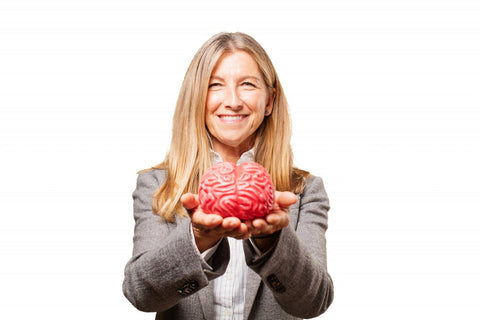Did you know that hot flashes originate in the hypothalamus, insomnia is closely related to the brain stem, and sudden mood swings have to do with the amygdala? Scientists claim that the explanation for many of the symptoms of menopause lies in the brain, not the ovaries.
Why do men and women age differently?
Although there is no such thing as a gendered brain, the data indicate that pathologies such as anxiety, depression or migraines affect the female population more. Not to mention Alzheimer's. The renowned neuroscientist Lisa Mosconi, who has studied the female brain for more than 20 years and who heads the Prevention Program for this disease at the Weill Cornell Medical Center (New York), "of the six million Americans who suffer from it, two thirds are women." So, what is the key? "The brain of a man and a woman age differently, and menopause has the answer," emphasizes the researcher. Specifically, that answer is provided by female sexual hormones, especially estrogen.
While in men, testosterone levels decrease with age but do not deplete until practically the end of their life, in women, estrogen levels begin to decrease in perimenopause until they disappear in postmenopause, which on average is at 55 years of age.
Estrogens and the brain
It is quite common to associate sexual hormones - especially estrogens - with aspects such as hair, voice, curves, fertility... But their relationship with the brain system is very close. So much so that the health of the ovaries and the brain are connected. To begin with, as Lisa Mosconi points out, "estrogens are key to the production of brain energy." When their levels decrease, this energy decreases by up to 30%... The maintenance of cerebral vascularization also depends on these hormones because we have about 600 kilometers of blood vessels in the brain and they keep the circulation active.
Other functions that the expert points out are: they regulate the musculature of blood vessels; they have a neuroprotective role and help preserve brain fat (the brain is our fattiest organ). In short, the brain in menopause loses all the beneficial actions of estrogen. The result? Its health is much more fragile than that of a woman with optimal hormone levels and, of course, than that of a man at the same age.
Menopause in the brain
The fact that estrogens stop performing their functions in certain parts of the brain favors the appearance of secondary symptoms such as hot flashes, brain fog, certain memory loss, listlessness, anxiety... these are aspects that 80% of women suffer from when they approach this stage.
On the other hand, scientific studies confirm the relationship between these hormonal changes and the predisposition to certain neurodegenerative diseases such as Alzheimer's or Parkinson's.
The interactions between the reproductive system and the brain are crucial for brain aging. For this reason, different studies have shown that the brains of men and women age differently, caused in large part by this hormonal difference.
In women, both the brain and the ovaries are part of the endocrine system, which regulates hormones. The brain sends signals to the ovaries, which respond accordingly. At the same time, hormones like estrogen are not only involved in reproduction, but also in brain function. And estrogen in particular is actually key to energy production in the brain by helping neurons use glucose as an energy source. So when estrogen levels drop, neurons begin to shrink, have less ability to produce energy, and age faster, which can lead to the formation of amyloid plaques, or Alzheimer's plaques, which are a hallmark of Alzheimer's disease.
These effects are stronger in specific regions of the brain such as the hypothalamus, which is responsible for regulating body temperature through the thermoregulatory center. Due to the hormonal instability that occurs during menopause, the hypothalamus is hyperstimulated, causing the thermoregulatory center to become hyperactive and consequently increasing body temperature, causing hot flashes to appear.
The brain stem, which is responsible for sleep, causes insomnia.
The amygdala, the emotional center of the brain, causing mood swings.
Ultimately, the brain and hormones are connected, so the onset of menopause causes women to experience a series of physical and psychological symptoms. In addition, menopause affects the cognitive performance of the brain, which can cause memory loss and, in the most severe cases, Alzheimer's.
Maintaining good brain health
You may think about reading; doing memory exercises; hobbies… However, the evidence makes it clear that lifestyle is the main preventive factor, and specialists propose some simple changes:
1. Become aware of the changes of this transition.
Walk a lot, at a good pace and, if possible, in a natural environment. Our brain comes from a nomad who walked very long distances in nature.
2. Introduce some changes in your diet:
Eat more healthy fats (blue fish; avocado; eggs; seeds; nuts…), slow-absorbing carbohydrates (whole grains, legumes…) and fiber.
3. Promote good sleep hygiene.
4. Listen to your body and be attentive to its signals.
5. Try to avoid stressful situations.
All of this will not stop the inevitable loss of estrogens, nor will they gradually stop performing their functions, but it will be key to keeping the brain in the best possible shape, even during menopause.
Dr. Lisa Mosconi is a neuroscientist. She is Director of the Women's Brain Initiative and Associate Director of the Alzheimer's Prevention Clinic, where she serves as Associate Professor of Neuroscience in Neurology and Radiology.
In this TEDWomen 2019 talk, Lisa Mosconi explains that many of the symptoms of menopause – hot flashes, night sweats, insomnia, memory lapses, depression or anxiety – begin in the brain. So how does menopause affect cognitive health?
References
Zuñiga, O. (2023, May 25). How your brain changes during menopause. Better With Health.
García, I. (2021, September 20). How does menopause affect the brain? Menopause Institute.
Derbyshire, M. (2023, December 22). Understanding the brain during menopause - International Menopause Society. International Menopause Society.
body/hormonal-health. (2024, April 10). WeLife.
Stadler, MM (2020, March 31). How menopause affects the brain. Women in Science.




Comments (0)
There are no comments for this article. Be the first one to leave a message!